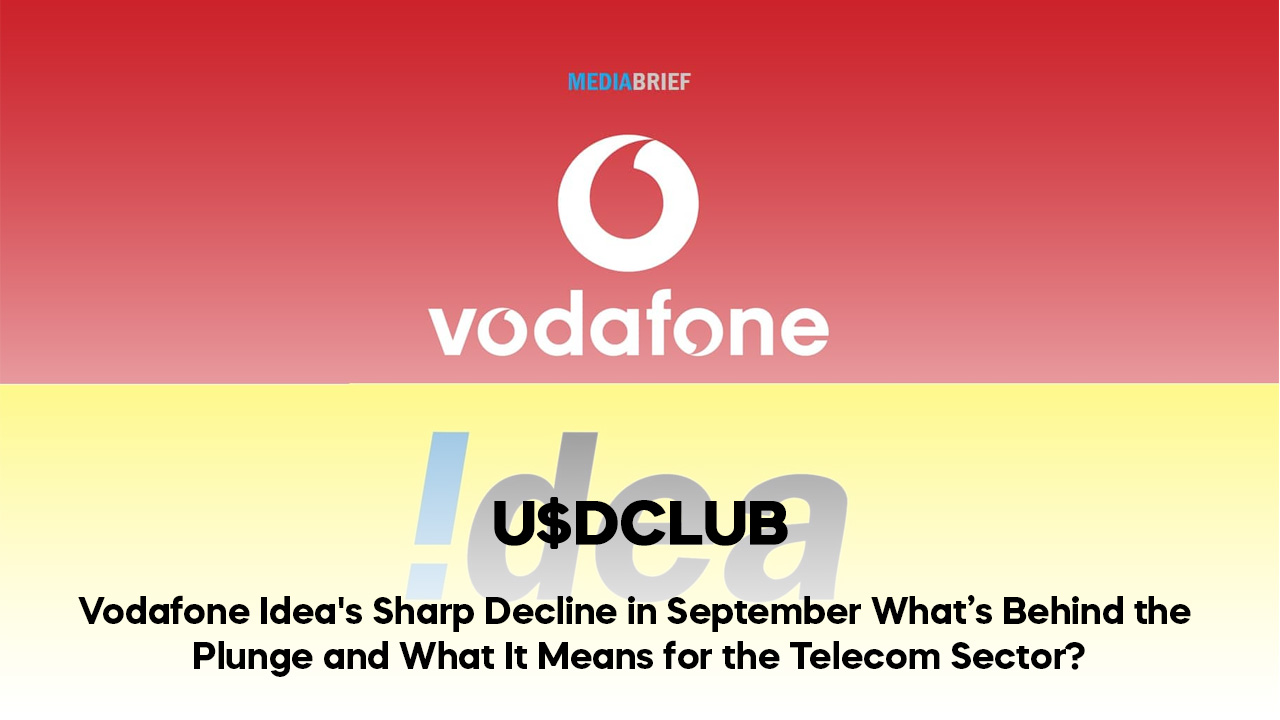In recent weeks, Vodafone Idea has found itself in the spotlight for all the wrong reasons. September 2024 saw a sharp decline in the company’s shares, marking the steepest drop since October 2019. Investors have been left scrambling to assess the future of Vodafone Idea as the company faces mounting challenges, from legal setbacks to market competition. This article dives deep into what’s behind this significant decline, its implications for the Indian telecom sector, and what investors should consider moving forward.
Vodafone Idea’s Steep Decline: The Numbers Tell the Story
Vodafone Idea’s share prices have fallen by more than 33% in September, a shocking turn of events that has investors concerned about the company’s future. The company’s market capitalization fell dramatically from ₹1.06 lakh crore to ₹72,000 crore in just one month, with share prices declining from ₹15.64 to ₹10.36 per share.
This sharp decline is reminiscent of the tumult the company faced in 2019 when it grappled with financial stress after the Supreme Court ruled on the Adjusted Gross Revenue (AGR) dues that telecom operators owed to the government. Now, in 2024, history appears to be repeating itself.
The Supreme Court’s Decision: A Key Catalyst for Decline
One of the primary drivers behind Vodafone Idea’s decline is the recent ruling by the Supreme Court of India. The company had appealed to the court to allow a recalculation of its Adjusted Gross Revenue (AGR) dues, seeking relief in the form of reduced penalties and interest. This would have significantly lessened the financial burden on the company, giving it room to breathe in an already highly competitive market.
However, the Supreme Court rejected Vodafone Idea’s plea, refusing to provide any relief regarding the penalty and interest levied on the AGR dues. The ruling sent shockwaves through the stock market, as investors quickly realized the severe implications this would have on the company’s already precarious financial situation. The rejection left Vodafone Idea facing a monumental debt pile, without any signs of regulatory leniency.
How AGR Dues Have Crippled Vodafone Idea
The issue of AGR dues has been one of the largest hurdles for telecom companies in India, particularly Vodafone Idea. The Supreme Court’s decision a few years ago, which upheld the government’s definition of AGR, imposed a massive financial burden on telecom operators.
For Vodafone Idea, the ruling meant it owed tens of thousands of crores in additional dues, which included not only the principal amount but also hefty penalties and interest. The company has been struggling ever since to cope with this financial liability, which has severely impacted its ability to invest in expanding its network and improving services. With the Supreme Court’s recent refusal to reduce these dues, the company’s financial health looks even more precarious.
Cash Flow Challenges Ahead for Vodafone Idea
The rejection of the plea to reduce AGR dues has opened the door to increasing cash flow problems for Vodafone Idea. According to IIFL Securities, the company could face severe liquidity issues as it tries to manage debt obligations, operational expenses, and the need to invest in network upgrades to remain competitive.
With declining share prices and a reduced market capitalization, raising fresh capital may become increasingly difficult for Vodafone Idea. While the company has previously sought equity infusion from promoters and institutional investors, the current scenario may deter potential investors who are concerned about the company’s ability to turn things around.
Airtel’s Opportunity Amid Vodafone Idea’s Struggles
As Vodafone Idea grapples with its financial woes, rival telecom operators stand to benefit from the situation. Indian Airtel, in particular, is in a strong position to capitalize on Vodafone Idea’s challenges. As IIFL Securities points out, Airtel could see this as an opportunity to increase its market share, especially as Vodafone Idea’s ability to invest in network infrastructure and expand its customer base diminishes.
Airtel, which has been financially healthier than Vodafone Idea in recent years, has the flexibility to invest in network enhancements, expand its 4G and 5G offerings, and attract customers who may be dissatisfied with Vodafone Idea’s service. Moreover, Airtel’s ability to raise funds through the capital markets has been more robust, enabling it to stay ahead of the competition.
Recent Developments: Nokia Contract Brings Some Relief
Despite the bleak outlook, there is a silver lining for Vodafone Idea. The company recently secured a ₹3.6 billion contract with Nokia, which will focus on upgrading Vodafone Idea’s 4G and 5G network capabilities over the next three years. This partnership could provide Vodafone Idea with the technological edge it needs to stay competitive, even as it faces financial hurdles.
The network upgrade is crucial in the current telecom landscape, where consumers are increasingly demanding faster and more reliable internet services. With 5G set to revolutionize how businesses and individuals use the internet, staying on top of this technological wave is essential for telecom operators.
However, it’s worth noting that while this contract may help Vodafone Idea improve its infrastructure, it does not solve the core issue of its mounting debt and cash flow constraints. The question remains whether Vodafone Idea can execute its network expansion plans while managing its financial obligations.
What’s Next for Vodafone Idea?
Potential Outcomes
- *Debt Restructuring*: One possible outcome is that Vodafone Idea may seek to restructure its debt to buy more time for recovery. This could involve negotiating with creditors to extend repayment deadlines, reduce interest rates, or convert debt into equity. While this could provide temporary relief, it is not a long-term solution unless the company can significantly improve its revenue generation.
- *Merger or Acquisition*: In the past, there have been speculations about the potential for mergers or acquisitions within the Indian telecom sector. Given Vodafone Idea’s current financial state, it may become an attractive acquisition target for a rival or international player looking to enter the Indian market. Such a move could inject much-needed capital into the company and help streamline operations.
- *Government Bailout*: Another potential scenario is government intervention. The Indian government has previously shown willingness to support struggling telecom companies, given the sector’s importance to the economy. A bailout package, in the form of reduced taxes or deferred payment schedules, could provide Vodafone Idea with breathing space to stabilize its operations.
- *Customer Retention Efforts*: To stay afloat, Vodafone Idea will need to focus on retaining its existing customer base. Aggressive pricing strategies, improving customer service, and enhancing network reliability could help prevent a mass exodus of subscribers to rival networks like Airtel and Jio.
The Impact on the Broader Telecom Industry
The challenges faced by Vodafone Idea are not just limited to the company itself but have broader implications for the Indian telecom industry. With three major players (Airtel, Jio, and Vodafone Idea) vying for market dominance, the financial struggles of one could shift the competitive balance.
If Vodafone Idea’s situation worsens, it could lead to increased consolidation in the industry, reducing the level of competition and potentially leading to higher prices for consumers. At the same time, the collapse or significant downsizing of Vodafone Idea could result in job losses and reduced investment in rural and underserved areas, which rely on telecom operators for internet connectivity.
Investor Sentiment and What to Watch For
For investors, the situation with Vodafone Idea is a stark reminder of the risks associated with the telecom sector. Regulatory decisions, competitive pressures, and financial liabilities can all have a significant impact on stock performance. Moving forward, investors will need to closely monitor several key factors:
– *Debt Management*: How Vodafone Idea handles its debt obligations will be crucial in determining its future. Any signs of successful debt restructuring or new capital infusion could restore investor confidence.
– *Network Upgrades*: The execution of the Nokia contract and the expansion of Vodafone Idea’s 4G and 5G networks will be important to watch. If the company can deliver on its promises, it may regain some competitive ground.
– *Customer Retention*: Retaining and growing its subscriber base will be critical for Vodafone Idea. Investors should pay attention to customer churn rates and whether Vodafone Idea can implement strategies to win back market share.
– *Government Intervention*: Any signs of government intervention, such as a bailout package or policy changes that benefit the telecom sector, could provide relief for Vodafone Idea and its investors.
Conclusion: A Crucial Juncture for Vodafone Idea
Vodafone Idea’s sharp decline in September is a wake-up call for the company and its stakeholders. The Supreme Court’s refusal to reduce AGR dues has exacerbated the company’s financial challenges, and the road ahead is fraught with uncertainty. While there are some positive developments, such as the Nokia contract, these are not enough to fully alleviate the company’s financial burdens.
As the telecom sector continues to evolve, Vodafone Idea will need to take decisive action to address its debt, improve its network infrastructure, and retain its customer base. Whether through mergers, government intervention, or new investment, the company must find a way to stabilize its operations and regain investor confidence.
For more updates on the latest developments in the cryptocurrency market and insightful investment strategies, stay tuned to *USDCLUB.us*, where we provide timely news and analysis from the world of finance.







